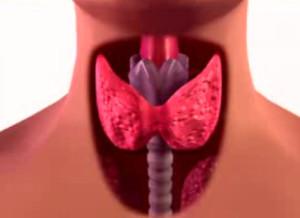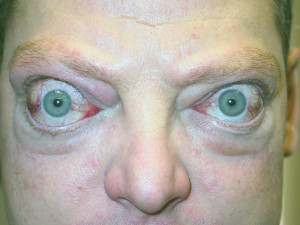What is Graves disease ?
Graves’ disease is a disorder of the immune system that leads to the overproduction of thyroid hormones or hyperthyroidism. It is the leading cause of hyperthyroidism
The thyroid hormones are essential for the regulation of a number of body systems and hence the symptoms of Graves’ disease are varied and affect the overall health of the body. The condition is not fatal and usually affects women younger than 40 years of age. Treatment is aimed at decreasing the levels of thyroid and diminishing the severity of the associated symptoms.
Graves disease symptoms
Some of the signs and symptoms of Graves’ disease are listed below:
- Anxiety
- Sleeping difficulties
- Irritability
- Excessive tiredness or fatigue
- Hands or fingers may have a fine tremor
- The heartbeat is irregular or rapid
- Increased perspiration leading to moist and warm skin
- Unexplained loss of weight
- Increased heat sensitivity
- The thyroid gland becomes enlarged
- Diminished libido or erectile dysfunction
- Menstrual cycle changes
- Diarrhea or frequent movements of the bowel
- Graves’ dermopathy: This condition is a rare manifestation of Graves’ disease and result in increased thickness and redness of the skin, usually on the top of the feet or the shins.
- Graves’ ophthalmopathy: Nearly fifty percent of the individuals affected by Graves’ disease experience symptoms associated with another condition known as Graves’ ophthalmopathy. In this condition, the tissues and muscles near the eyes get affected due to inflammation and certain immune system dysfunctions. Its produces the following symptoms:
- Bulging eyes
- Irritated and dry eyes
- Excessive tearing of the eyes
- Sensations of grittiness in the eyes
- Puffy eyelids
- Eye pain or pressure
- Inflamed or reddened eyes
- Double vision
- Sensitivity to light
- Restricted eye movements, leading to a fixed stare
- Rarely, corneal ulcers
- Rarely, diminished or blurred vision
- There are many complications that can result from Graves’ disease such as thyroid storms, problems during pregnancy, cardiac conditions and weakening of the bones.
Causes of Graves disease
Graves’ disease is caused due to a malfunction of the immune system of the body. The immune system produces many antibodies to counter the effects of bacteria, germs and other microorganisms and thus protect it from ill-health and harm. However, in individuals with Graves’ disease, the immune system produces an antibody known as thyrotropin receptor antibody or TRAb, to counter the effects of a protein that is found in the cells of the thyroid gland. The exact reasons for this dysfunction of the immune system are unknown.
The functions of the thyroid gland are coordinated and regulated by the pituitary gland located in the brain. The antibody produced by the immune system in patients with Graves’ disease can essentially mimic the regulatory activities of the pituitary gland. Such overriding of pituitary gland actions by the antibody results in excessive production of thyroid hormones leading to hyperthyroidism.
The thyroid hormones control a number of vital bodily functions such as muscle strength, cardiac and nervous system functions, the metabolic processes, menstrual cycles and body temperature. Hence, Graves’ disease results in the general decline in the patients’ health and quality of life.
Graves’ ophthalmopathy causes: The exact cause of the condition is unknown, but studies indicate that the TRAb antibody get attracted to the tissues surrounding the eyes, triggering immune system events and inflammation, that result in the eventual symptoms of the condition.
Anyone can get affected by Graves’ disease, but there are certain risk factors that increase the vulnerability towards developing the condition. They are as follows:
- A family history of Graves’ disease
- An age of 40 years or below
- Being of the female gender
- The presence of other autoimmune disorders such as rheumatoid arthritis or type 1 diabetes
- Recent childbirth or pregnancy
- Increased levels of physical or emotional stress
- Cigarette smoking
Graves disease treatment
The primary aim of the treatment for Graves’ disease is to limit the production of thyroid hormones and to block the debilitating effects of excessive thyroid hormones in the body
Some of the treatment options are as follows:
- Radioactive iodine therapy: This therapy involves the intake of oral radioactive iodine. The thyroid gland uses iodine to produce the hormones and thus radioactive iodine results in the destruction of the excess cells in the thyroid gland. The therapy has some side effects such as risk to Graves’ ophthalmopathy or its worsening, temporary reduction in testosterone levels, neck tenderness and short-term increase in thyroid hormones. Since the therapy results in decreased production of thyroid hormones, one may require thyroid replacement therapy in the future to normalize the hormone levels in the body.
- Anti-thyroid medications: These medications affect the ability of the thyroid gland to use iodine to produce hormones. They have to be consumed on a long-term basis for effective results. They can also be taken to supplement radioactive iodine therapy. Some of the side effects include rashes, liver abnormalities and joint pains.
- Beta blockers: These may be used to block the effects of increased levels of thyroid hormones in the body to provide relief from symptoms such as muscle weakness, anxiety, cardiac conditions, etc.
- Surgery: Surgery involves the removal of the thyroid gland. There are many risks to surgical removal of the thyroid and must be done only as the last option. Also, surgery would lead to a lifetime of thyroid replacement therapy.
- Graves’ ophthalmopathy can be treated by medications such as corticosteroids, or by orbital radiotherapy or eye surgery.
Graves Disease Diet
The iodine amount in the food has a telling effect on the hormonal synthesis by the thyroid gland. You have to keep a check on iodine rich diet because excess iodine leads to Graves’ disease in thyroid patients. In other words, avoid foods like iodized salt, shell-fish, seaweed, beef liver, kelp, broccoli, shrimp, corn, turkey, squid, clams, onions etc. You may also avoid chocolates, coffee, tea, peanuts and walnuts. Also, watch your sugar and white flour intake.
What you should incorporate in your diet includes healthy balance of fruits and vegetables. You should look for consuming at least 60 grams of protein per day, you should substitute your refine breakfast with the one made of wholegrains. Add Omega-3 fatty acids to your diet; steer clear of preservatives, refined vegetable fat, trans-fat. Omega 3 fatty acids can also prevent inflammation
Weight loss is a symptom for people, who have Graves’ disease, so if you want to bring this in control, go for high protein food and the ones that contain fat because fat due to its inherent quality of giving more time to the body to absorb nutrients, can work in your favor. Also have yogurt because they are a good natural supplement that can prevent the symptoms of Graves’ disease. Foods or supplements that contain Vitamin E, flaxseed oil, magnesium, glutamine, and GLA are also advantageous. Eat unsalted nuts, dried fruits, non-salted butter, grain pastas, egg whites, apple sauce and as mentioned before, fresh vegetables, fruits and wholegrain can make for an ideal Graves’ disease diet.
Graves disease pictures
Here are the photos of Graves’ disease, check out the bulged eyes, one of the prominent symptoms



